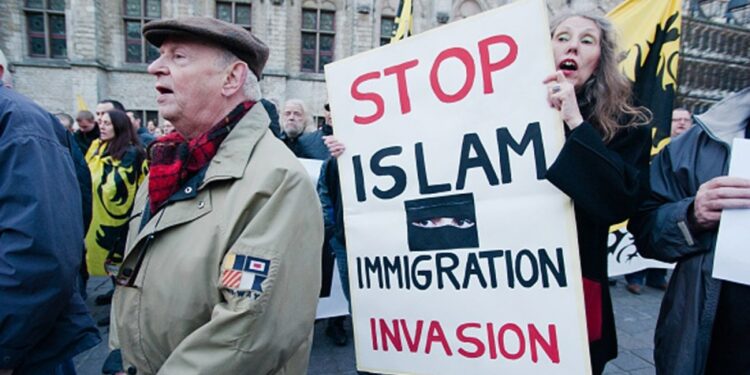by
But you can probably guess where the stoked-up fear over mostly Muslim refugees comes from: the deluge of denigrating myth-making and panic-mongering by media and politicians alike, presenting Muslims as a kind of fifth column, or as communities of terrorist sleeper cells within Europe – even though, quite obviously, Muslims are actually fleeing terror, as inflicted by ISIL in Iraq and Syria.
A far more understandable concern, though, is over access to jobs and resources – because cruel austerity cuts across Europe have put the squeeze on these, increasing job insecurity and forcing people to work long hours, taking less pay while living costs keep rising. That’s the bit that connects Europe’s financial crisis with migration and the rise of the far-right.
Austerity breeds extremism
As Daphne Halikiopoulou, professor in comparative politics at the UK’s university of Reading, argued a few months ago, austerity breeds right-wing extremism because of the work insecurity experienced by the middle classes.
“When a crisis hits, those who have a job fear that they will lose it. Those who don’t have a job (or those who do lose it) fear that they will have no safety net or alternative means of subsistence,” she wrote in the Huffington Post, adding that, the greater the insecurity experienced, the more likely this would result in support for the far-right.
The leader of Podemos, Pablo Iglesias, and his team [EPA]
And that is where the progressive left comes in, the kinder side of Europe’s depressing political map. It’s the other political force that surged across Europe last year, and one that wants to tackle the issue of squeezed resources in a different way – by putting a stop to those savage, ideologically-driven cuts, for a start.
Last year began with a resounding win for Greece’s anti-austerity Syriza party and ended with Podemos in Spain, a party that came into being only two years ago, breaking a decades-long two-party monopoly in elections in December.
Sandwiched between those two events was the anti-austerity Scottish Nationalist Party winning all but three seats in Scotland in the UK’s May election, and the anti-austerity socialist Jeremy Corbyn unexpectedly taking the helm of Britain’s Labour party in a landslide leadership victory a few months later.
Seeking alternatives
These progressive parties are focused not just on the Europe-wide obsession with avoidable, counter-productive cuts – these have prolonged the financial crisis – but over the nature of the Europe Union itself.
ALSO READ: Political uncertainty in Spain as new forces emerge
If the current version of the EU – with its unelected power-wielding European Central Bank and European Commission – is all about preserving and extending neo-liberalism through deregulated financial markets and race-to-the-bottom work conditions, those nascent progressive parties are seeking alternatives.
Coming up from – and constantly referring to – grassroots support bases, these movements want stronger employee rights, fairer taxes and a welcoming approach to migrants – rightly seen as contributing to, rather than taking from, domestic economies.
That progressive politics fared so well in polling booths during 2015 speaks to a growing appetite for alternatives to the welfare-state-shrinking, elites-serving, fortress-Europe-enforcing politics that has been the prevailing force across Europe’s major countries for so long.
It’s the counter to the troubling surge in support for the xenophobic, hate-spreading far-right. It’s the politics of hope – and for the first time in a long time, it’s quite possible that it might just triumph over the politics of fear.
Rachel Shabi is a journalist and author of Not the Enemy: Israel’s Jews from Arab Lands.
The views expressed in this article are the author’s own and do not necessarily reflect Al Jazeera’s editorial policy.
Source link : https://www.aljazeera.com/amp/opinions/2016/1/5/a-rupture-in-europe-but-whose-politics-will-prevail
Author :
Publish date : 2016-01-05 08:00:00
Copyright for syndicated content belongs to the linked Source.



